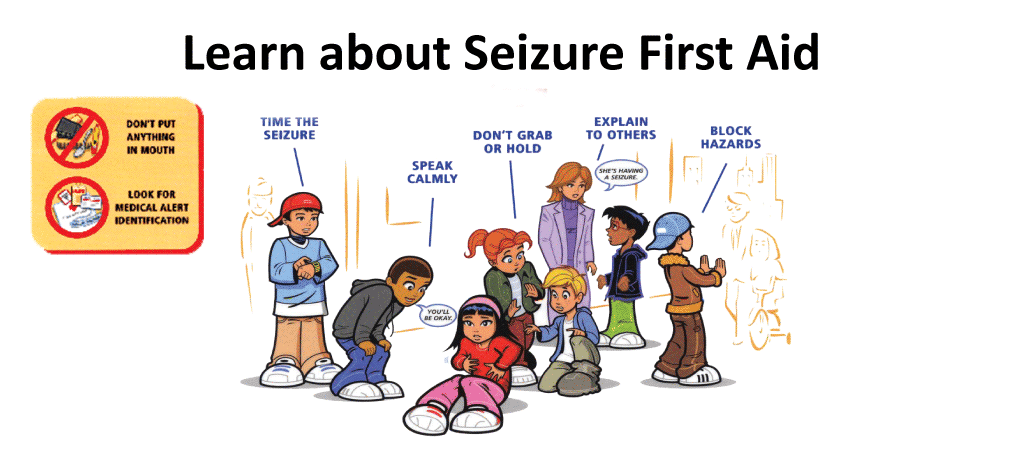First Aid

First Aid
Watching your child have a seizure can be upsetting and frightening. Even more concerning for most parents is the chance that your child could have a seizure when you're not there. The first step is to learn what to do if your child has a seizure. The next is to teach others who may be with your child when you're not.
The most important thing to do when a child has a seizure is keep the child safe. Often, you don't need to do anything but wait for the seizure to end. A child might just have a short staring spell and then go on as if nothing happened. Or a child could suddenly fall, but then just need a little comforting or help getting up.
What To Do If A Child Has A Generalized Seizure
If a child has a "grand mal' or tonic-clonic seizure (cries, falls, stiffens and then starts moving in jerking, uncontrolled movements), here are the things to remember:
DO:
- Move anything that could hurt the child
- Put something soft and flat under the child's head (pillow, folded jacket or sweater)
- Turn the child gently to one side to prevent choking
- Loosen anything around the child's neck
- Keep track of how long the seizure lasts and other important information to tell your doctor using the forms and tools available in our Toolbox
- Stay calm and comfort the child afterward
DON'T:
- Try to hold the child
- Try to stop any movements or tongue-biting
- Try to open or put something in the child's mouth
When to Get Medical Attention
Most of the time, you do not need to call 911 or go to the emergency room when a child has a seizure. However, you should get immediate medical care if:
- It is the child's first seizure
- The seizure lasts more than five minutes
- The seizure happened in water that the child may have swallowed
- The child has diabetes or a high fever
- There is a risk of a head or other injury
- The child is having trouble breathing after the seizure (Do not try to give a child mouth-to-mouth resuscitation during a seizure. If the child is not breathing after the seizure, first call 911 and then try CPR while waiting for the ambulance)
Continuous Seizures
Prolonged or cluster seizures — seizures that don't stop after five minutes or continue one after another — can turn into status epilepticus, which means a “continuous state of seizure.” This requires immediate medical attention. It is good to have written instructions from your doctor to give to the paramedics or emergency room staff in case your child ever experiences a continuous seizure. You should also know where the closest and best hospital is.
If your child has a continuous seizure:
- Call an ambulance. Do not try to move your child unless there is no other choice.
- Ask your doctor to call the emergency room and let them know you're coming.
- If you have written instructions from your doctor for the doctors and paramedics, make sure you have them.
There are some new treatments available that can stop a prolonged seizure. Some can be given to children by parents or caregivers orally (by mouth), rectally (rear end) or by injection (needle). If your child experiences continuous seizures, ask your doctor if any of those treatments are an option.
Summary: How to Keep Your Child Safe During a Seizure
During a seizure, the most important thing you can do is keep your child safe. You can help do that by remembering the following:
- Stay Calm - A seizure is frightening for everyone. The calmer you are, the better
- Don't Restrain
- During a seizure, the less you have to move or touch a child, the better.
- Do not try to stop the child's movements or force anything in the child's mouth.
- Observe & Report
- Try to remember as much as you can about the seizure to tell your doctor after.
- Monitor or watch your child after the seizure. Your child may seem tired or confused, complain of sore muscles, or have a headache. Contact your doctor immediately if you are concerned.
Tools to Help Teach Others
As children grow, they spend more and more time away from their parents. It is important to make sure teachers, coaches, babysitters, relatives and others know what to do in case of a seizure. Print this page or use these materials to teach them:
Resources
Epilepsy Centers
Epilepsy centers provide you with a team of specialists to help you diagnose your epilepsy and explore treatment options.
Epilepsy Medication
Find in-depth information on anti-seizure medications so you know what to ask your doctor.
Epilepsy and Seizures 24/7 Helpline
Call our Epilepsy and Seizures 24/7 Helpline and talk with an epilepsy information specialist or submit a question online.
Tools & Resources
Get information, tips, and more to help you manage your epilepsy.



